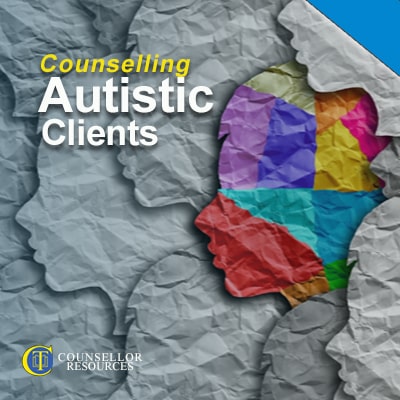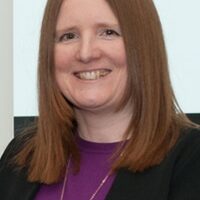In this lecture, counsellor Lisa Cromar will teach you:
- what autism is
- the differences that an autistic person may bring
- what it is like to live with autism
- how to work effectively with autistic clients.

Watch this Lecture + Access Hundreds of Hours of CPD
Certified CPD for Qualified Counsellors
- Hundreds of hours of on-demand CPD lectures to help you stay current with your CPD ethical requirements
- Support, and be supported, by thousands of other counsellors as a member of the exclusive online community.
- Access your learning anytime you want ... anywhere you choose ... using any device type — desktop or mobile.

You will learn much evidence-based information about autism, including:
- the two criteria for the diagnosis of autism, as specified in the Diagnostic and Statistical Manual (DSM) for Mental Disorders
- the causes of autism, including its genetic basis
- the prevalence of autism
- co-morbid psychiatric disorders and behaviours
- famous people past and present with autism
- the taboo faced by people with autism, and how this is fuelled by the media
- sensory processing disorder
- theory of mind/mentalising and how this offers insights into autism.
Lisa explains how it feels to be autistic, giving you an insight into the challenges of living with autism. This includes aspects of verbal communication, personal and body language, masking and executive functioning.
From the greater understanding of living with autism that this lecture will give you, you will be better equipped to respond to autistic clients.
Key elements in counselling this client group are the use of the core conditions, the therapeutic relationship and creativity. Lisa also looks at how different modalities work with autism, including cognitive behavioural therapy (CBT), psychoanalysis and gestalt therapy.
Lisa draws on over 40 pieces of evidence-based information, all of which are fully referenced so you can read further into this topical and fascinating topic that will equip you to work more effectively with autistic people.
Free Handout Download
Counselling Clients with Autism
About the Lecture Presenter

Hi, I am Lisa Cromar. I am a qualified Person-Centred Counsellor and am studying towards a PhD whereby I aim to improve research in counselling and autism.
In my academic career, I am honoured to have received some awards, including a Professional Learner of the Year Award from Cheshire College South and West and a Dean’s Award and the Vice-Chancellor’s Award from the University of Derby. I have also appeared on Anna Kennedy’s Autism Hour for the Women’s Radio Show (available on podcast).
I have a personal interest in autism in large part because I found out at the age of 37 that I am autistic (my formal diagnosis being Asperger's Syndrome).
This revelation came about because my eldest son, Harry (now 15) had struggles growing up due to autistic traits, including difficulties with behaviour regulation and socialising. In the process of researching autism and trying to understand his needs, I started to identify traits within myself. It is very common for people my age to discover they are autistic following the discovery of it in a child. So in 2016, I am proud to say my son and I both received a diagnosis of autism.
I have gone on to have two more children. My daughter Hazel, now 8, is starting to show traits of autism. It is common in girls (and some boys), for it to become more obvious at a later stage as friendships become more complicated and they start to lag behind their peers socially. This is the case for my daughter and her anxiety around other people, school and sensory sensitivities are increasing.
I also have another son Lewis, now 6, who I realised very early on was autistic. He was delayed in some of his key development in areas which indicate autism, like not pointing by the age of 18 months old for example. He also has delayed speech, and when it did start to develop, it came out as echolalia/scripting. This means he only repeated words or phrases; he didn’t speak spontaneously. It was quite ingenious--he learnt how to communicate his needs using only phrases from nursery rhymes. He had a whole repertoire of songs to do this.
Professionally I specialise in working with autistic clients at a local college. Additionally, I provide autism awareness workshops training counsellors in how to make counselling more accessible to this client group, increasing counsellor confidence in working with this group which is currently known to be generally low.
I have presented at conferences alongside Janet Tolan, Pete Sanders, Mick Cooper (The Person-Centred Trainers Conference) and Andrew Reeves (The University of Salford Creative Therapies Conference). During lockdown, I have provided online training for counselling organisations, and at conferences for BACP Private Practice and the Creative Counsellors Association.
I am the author of the pioneering literature review: Exploring the Efficacy of Person-Centred Counselling (PCC) for Autistic People, published in the spring 2019 edition of The Person Centred Quarterly (PCQ) and as a chapter in the Neurodiversity Reader, Pavilion Publishing and Media Ltd. The review highlights that although the research in this area is minimal, what is available, demonstrates that PCC, with adaptations, is a highly effective modality for the autistic client group.
The review highlights research which shows that Rogers’ (1967) core conditions; empathy, unconditional positive regards, congruence and the relationship are vital for positive therapeutic outcomes when working with autistic clients. It also supports research, which found that autistic clients experience extreme levels of conditions of worth, in large part due to failing to comfortably ‘fit in’ to societal expectations. PCC is known to be highly effective for addressing conditions of worth. I have also written an article for the Creative Counsellors Club, called Creative Counselling for Autistic Clients.
I have cofounded the Facebook forum ‘Counsellors Working for Neurodivergence.’ We aim to raise awareness of autism on this page and bring counsellors together across the field to advance knowledge of autism in counselling. This is a lively page which has over 1500 members.
Although my primary modality is Person-Centred Counselling, my awareness training can help counsellors of any modality. In fact I have provided bespoke training to driving instructors before.
My eventual career goal is to assume responsibility for pioneering a version of person-centred counselling for autistic people. I aim to play my part in making the world a better place to live when autistic.